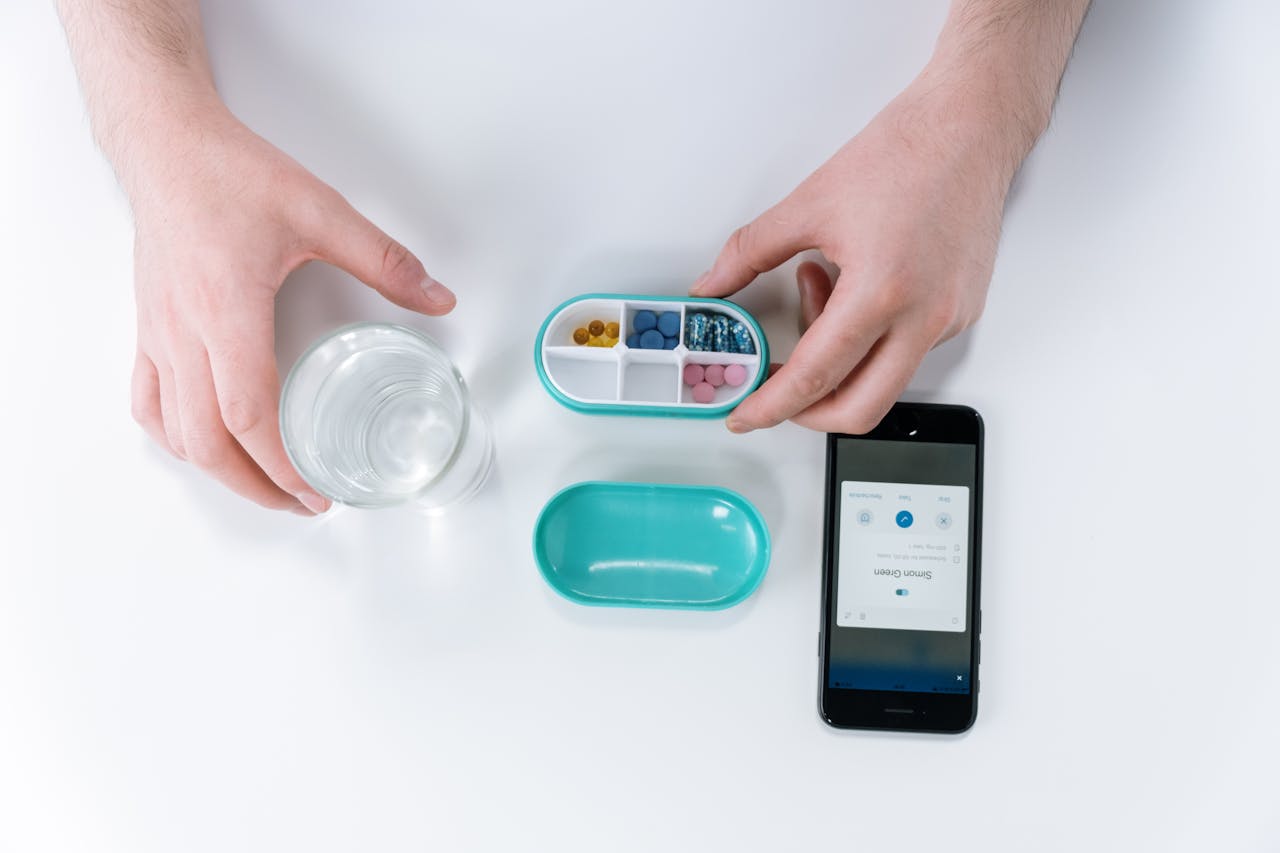PCOS and high cholesterol: How are they linked and how to support your health?

Is there a direct link between PCOS and high cholesterol? Click to find a complete guide exploring the link and suggesting effective management strategies!
High cholesterol is a condition in which “bad” LDL cholesterol builds up in your blood vessels, potentially leading to heart disease. Although it’s not a direct symptom of polycystic ovary syndrome, as many as 50-70% of women with PCOS develop hyperlipidemia (high levels of “bad” LDL cholesterol, triglycerides, or both).
The link between PCOS and high cholesterol is explained by:
- Insulin resistance
- Hormonal imbalance
- Chronic inflammation
- An increased risk of metabolic syndrome and cardiovascular disease
Luckily, it’s possible to prevent or address PCOS high cholesterol with such management techniques as following a healthy diet, enhancing physical activity, managing stress, and managing your weight in a healthy and effective way.
PCOS is a hormonal condition that affects 5 to 6 million women in the US. By hindering the work of your ovaries and affecting the levels of essential hormones, this condition is broadly associated with increased risks of developing different health problems, including high cholesterol.
{{button}}
What Is High Cholesterol?
Cholesterol is a fat-like substance that has a waxy consistency. Although there are many myths surrounding it, it’s not “bad” for you by default because this substance is naturally occurring in our body and is crucial for supporting its functions, among which are digestion and hormone production.
There are two primary sources of cholesterol: your liver, where it’s produced to support your body and health, and certain foods, especially those of animal origin.
The American Heart Association classifies cholesterol into three groups:
- High-density lipoprotein (HDL) - This group is what we call the “good” type of cholesterol. Its primary function is to carry cholesterol from different parts of your body back to your liver so that it removes it. High levels of HDL can protect your heart health.
- Low-density lipoprotein (LDL) - This group, on the contrary, contains the “bad” type of cholesterol. It’s considered dangerous due to its ability to build up in the arteries, forming plaques that shrink the space in your arteries and potentially leading to heart disease.
- Triglycerides - This group contains a specific type of fat found in your blood. In balanced amounts, it's crucial for your body and health as it's used as one of the primary energy sources. However, when your body contains excessive triglycerides, they can contribute to high cholesterol, hardening of the arteries, and thickening of the artery walls, which is also dangerous for your heart health.
Did you know? There’s also a lesser-known type of lipoprotein called very-low-density lipoprotein (VLDL). VLDL mainly carries triglycerides (rather than cholesterol) throughout your body. Like LDL, VLDL can also contribute to plaque buildup in the arteries and is considered a risk factor for heart disease.
Main Causes of High Cholesterol
The most common cause that leads to high cholesterol is lifestyle. The primary factors include:
- Eating a poor diet high in saturated and trans fats;
- Not including enough physical activity;
- Experiencing excessive, ongoing stress;
- Not getting enough sleep.
These causes are within your control and can be adjusted to prevent high cholesterol or reduce it if the problem is already there. However, there are also other causes that are out of your control, such as genetics, some medications, and certain health conditions.
Risks Associated With High Cholesterol
Typically, high cholesterol is not accompanied by any visible symptoms. The changes it causes flow unnoticed and take time to build up. However, when cholesterol builds up in your vessels, it blocks blood flow, leading to enhanced risks of heart disease and stroke.
Other potential consequences include artery disease, diabetes, and high blood pressure.
PCOS High Cholesterol: The Prevalence and Connection
According to studies, the prevalence of hyperlipidemia–a condition in which you have high levels of “bad” LDL cholesterol, triglycerides, or both–in women with PCOS is between 50% and 70%. This is a rather high percentage, making females with PCOS a big risk group for developing high cholesterol.
But can PCOS cause high cholesterol on its own? And what is the link between these two health conditions? Let’s break it down for a better understanding.
Is High Cholesterol a Sign of PCOS?
In order to explore the link between PCOS and high cholesterol, let’s first define whether the latter is actually a direct symptom of polycystic ovary syndrome.
The short answer is “no.” PCOS affects the work of your ovaries and the balance of essential hormones. The key signs associated with it include irregular menstrual cycle, fertility issues, weight gain, hair loss, acne, and others. However, in the long run, this condition can put you at an increased risk of developing other health problems, such as:
- Type 2 diabetes
- Mood swings and depression
- Sleep apnoea
- High blood pressure
- High cholesterol
- Endometrial cancer
What Factors Make PCOS Cause High Cholesterol
Although it’s not a direct symptom, now you know that high cholesterol is among the risks you can face later in life if you have PCOS.
So, why does PCOS cause high cholesterol? There are several factors that link these two conditions:
1. Insulin Resistance
Insulin resistance is a common issue facing about 65-70% of women with PCOS. In short, it’s a state in which your body doesn’t respond to insulin as they are supposed to, resulting in a elevated glucose levels in your blood and potentially leading to type 2 diabetes.
Insulin resistance consequently causes your body to produce more insulin hormone to get the cells to respond to it. Increased levels of this hormone also lead to an increased production of very-low-density lipoprotein (VLDL) cholesterol in your liver and a decreased number of LDL receptors, which can eventually cause high levels of LDL cholesterol in the bloodstream.
2. Hormonal Imbalance
As you should know, PCOS directly affects the balance of essential hormones in females, increasing androgen levels and creating severe imbalances.
Although there is no obvious link between your hormones and cholesterol. Studies revealed that cholesterol levels in healthy women vary with the phase of the menstrual cycle, which means they are linked to levels of essential hormones. In particular, fluctuations in estrogen levels can lead to higher levels of LDL. Respectively, hormonal imbalance in PCOS can also contribute to high cholesterol.
3. Chronic Inflammation
PCOS is broadly associated with chronic, low-grade inflammation/
According to various studies, there is a two-way connection between inflammation and high cholesterol. When it’s chronic, inflammation can significantly damage the body’s tissues and stimulate the development of various diseases. Additionally, it can adjust the typical lipid metabolism, causing your cholesterol levels to go up. And high cholesterol, in turn, can also contribute to more prominent inflammation.
4. Metabolic Syndrome and Cardiovascular Disease (CVD)
Finally, it’s also known that women with PCOS have an increased risk of developing metabolic syndrome (MS) and cardiovascular disease (CVD). Studies show that dyslipidemia, an imbalance in cholesterol and triglyceride levels, is a key contributor to the development of both MS and CVD. Specifically, dyslipidemia involves elevated levels of “bad” cholesterol (LDL) and triglycerides, along with reduced levels of “good” cholesterol (HDL), increasing the risk of these conditions.
Best Management Strategies for High Cholesterol PCOS
If you are already dealing with both high cholesterol and PCOS or want to prevent the development of high cholesterol in the future, there are a few management techniques that you can adopt now:
- Implement a healthy diet. The best diet for high cholesterol and PCOS is one that focuses on whole foods and strives for a good balance of essential nutrients while restricting trans fats, sugars, and refined carbs.
- Increase your physical activity. Start walking, cycling, and otherwise enhance your daily activity to support your health and improve your lipid profile and insulin sensitivity. Also, integrate the right, PCOS-friendly exercising.
- Focus on healthy and thoughtful weight management. Weight loss has a positive effect both on PCOS symptoms and cholesterol levels.
- Address daily stress. Find coping techniques that work for you to prevent chronic stress from worsening your condition.
FAQ
What is cholesterol?
Cholesterol is a waxy substance produced by the liver or received with food. It’s classified into three groups: “good” HDL cholesterol, “bad” LDL cholesterol, and triglycerides. Although some levels of cholesterol are crucial for different bodily functions, high cholesterol is widely associated with heart disease and stroke.
Is high cholesterol a symptom of PCOS?
No. The common symptoms of PCOS include irregular menstrual cycle, fertility issues, weight gain, excessive hair growth, hair thinning/loss, oily skin, and acne. High cholesterol is not listed among the signs of PCOS.
How is high cholesterol associated with PCOS?
Although high cholesterol isn’t one of the PCOS symptoms, there is a link between these two conditions as women with PCOS have a higher risk of developing different health issues later in life, including high cholesterol. According to studies, it’s possible that PCOS cause high cholesterol due to hormonal imbalances, chronic inflammation, and insulin resistance.
Conclusion
PCOS is a chronic hormonal condition that’s broadly associated with a variety of health issues. The direct symptoms of this condition include menstrual irregularity, hormonal imbalance, and fertility issues. On top of that, by causing deep inner imbalance, PCOS is proven to increase the risks of developing a range of serious diseases later in life, and high cholesterol is among them.
So, does PCOS cause high cholesterol? It can. The link between PCOS and high cholesterol may not be very obvious to a regular person, but it’s there. As you now know, PCOS can contribute to the development of high cholesterol due to insulin resistance, hormonal imbalance, and chronic inflammation. Use the coping strategies we shared in this guide to manage these conditions effectively and support your overall health!
{{pink-banner}}








.avif)
